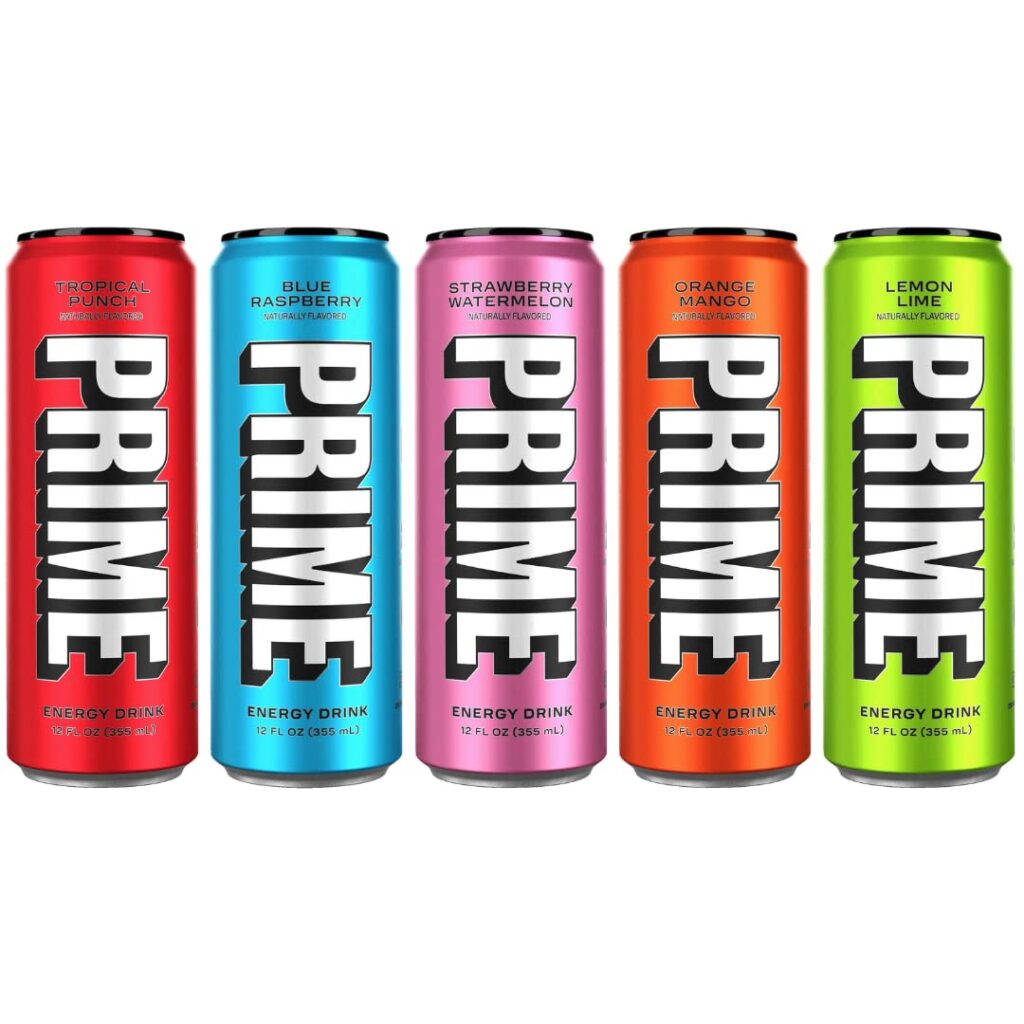FREE SHIPPING OVER $50
Prime Energy Drinks: How Much Caffeine Are You Drinking?
In the fast-paced world we live in, energy drinks have become a go-to for many of us. They promise instant energy, improved focus, and enhanced stamina. Among the myriad of options available, Prime Energy Drinks also known as Prime have emerged as a popular choice. But the question that often goes unanswered is, “How much caffeine am I drinking?”
Key Takeaways
Prime Energy Drink Caffeine Content

Caffeine is the heart and soul of any energy drink, and Prime energy drink is no exception. A typical can of Prime contains a substantial amount of caffeine, precisely 200mg per 12oz can. To put it in perspective, this is equivalent to the caffeine found in approximately two standard cups of coffee. This caffeine is what gives you that immediate kick, that burst of energy that the drink promises. But how much caffeine is too much? The answer to that depends on your tolerance and how your body metabolizes caffeine.
Prime Energy Drink Ingredients
Prime energy drinks are more than just caffeine. They contain a blend of ingredients designed to provide a balanced energy boost:
- Carbonated Filtered Water: The base of any good energy drink, providing hydration.
- Coconut Water from Concentrate: A natural source of hydration and electrolytes.
- Vitamins (Vitamin B6, Vitamin B12): These B-vitamins play a vital role in converting food into energy.
- Electrolytes (Sodium, Magnesium, Potassium): Essential for maintaining proper hydration and muscle function.
- Natural Flavors: These give Prime Energy Drinks their unique and refreshing taste.
- Artificial Sweeteners (Sucralose): Used instead of sugar to keep the drink low-calorie.
- Preservatives (Potassium Sorbate and Sodium Benzoate): These help extend the shelf life of the drink.
- Amino Acids (L-theanine and Taurine): These can enhance physical performance and mental focus.
These ingredients work together to enhance the effects of caffeine, providing you with sustained energy rather than just a quick boost.
Side Effects of Excess Caffeine
While the energy boost from Prime energy drinks can be beneficial, it’s important to be aware of the potential side effects of excess caffeine. Consuming too much caffeine can lead to a variety of health issues:
- Anxiety: Caffeine increases alertness by blocking adenosine, a brain chemical that makes you feel tired, and triggering the release of adrenaline. However, at higher doses, these effects may become more pronounced, leading to anxiety and nervousness.
- Insomnia: One of caffeine’s most prized qualities is its ability to help people stay awake. However, too much caffeine can lead to insomnia, disrupting your sleep patterns and leaving you feeling tired the next day.
- Digestive Issues: High doses of caffeine can lead to digestive distress, causing symptoms like stomachache and nausea.
- Rapid Heart Rate: Caffeine stimulates the nervous system, which can lead to a faster heart rate. This can be dangerous for individuals with heart conditions.
- Fatigue: While caffeine can provide a temporary energy boost, the crash that follows can leave you feeling more tired than before.
So, while Prime energy drinks can be a great pick-me-up, they should be consumed in moderation. Remember, balance is key when it comes to caffeine consumption.
Natural Alternatives to Energy Drinks
If you’re looking for healthier alternatives to energy drinks, there are plenty of options:
- Coffee and Matcha: These offer caffeine without added synthetic B vitamins or sugar.
- Green Tea: Known for its natural energy-boosting properties and high levels of antioxidants.
- Yerba Mate: An herbal tea that contains natural stimulants like theophylline and theobromine.
- Kombucha: A fermented tea drink rich in probiotics and B vitamins.
- Coconut Water: A natural source of electrolytes, which makes it an effective way to rehydrate and replenish energy levels.
Easing Caffeine Addiction
If you’re trying to cut back on caffeine, here are some tips:
- Gradual Reduction: Lower the dose of caffeine over time. Replace one caffeine drink a day with a caffeine-free option.
- Stay Hydrated: Drink plenty of water to help manage withdrawal symptoms.
- Healthy Diet: Maintain a balanced diet to keep your energy levels stable.
- Regular Exercise: Physical activity can help reduce cravings and improve mood.
- Adequate Sleep: Ensure you’re getting enough sleep each night to reduce the need for caffeine.
FAQs
Prime energy drinks contain 200mg of caffeine per 12oz can. This is roughly equivalent to the caffeine content in two standard cups of coffee.
Prime energy drinks can provide a quick energy boost, but they should be consumed in moderation due to their high caffeine content. Overconsumption can lead to health issues such as anxiety, insomnia, and rapid heart rate.
While Prime energy drinks are low in calories and sugar, their high caffeine content can pose health risks if consumed excessively. Therefore, they should be considered as part of a balanced diet and not a replacement for healthier beverages or food.
The Bottom Line
So, how much caffeine are you really drinking when you crack open a can of Prime energy drink? The answer depends on many factors, including the specific variant of the drink and your personal tolerance to caffeine. But one thing is clear: while these drinks can provide a much-needed energy boost, it’s important to consume them responsibly.
Related Articles
- Celsius Energy Drinks and Drug Tests: Reasons for False Positives
- Kettle and Fire Bone Broth Review: Benefits, Cost & More
- SEEQ Protein Review: Safety, Ingredients, and Benefits
- Easy Homemade Hibiscus Tea Recipe (Hot and Cold)
- How to Make Elderberry Wine at Home: Step-by-Step Recipe
- Brain fog: Causes, Symptoms and Medications
- Bee Pollen: A Natural Energy and Immune System Booster
- Fulvic Acid Unveiled: Unlocking the Fountain of Youth Naturally!
- Alpha-Lipoic Acid and Neuropathy: A Comprehensive Guide to Healing



